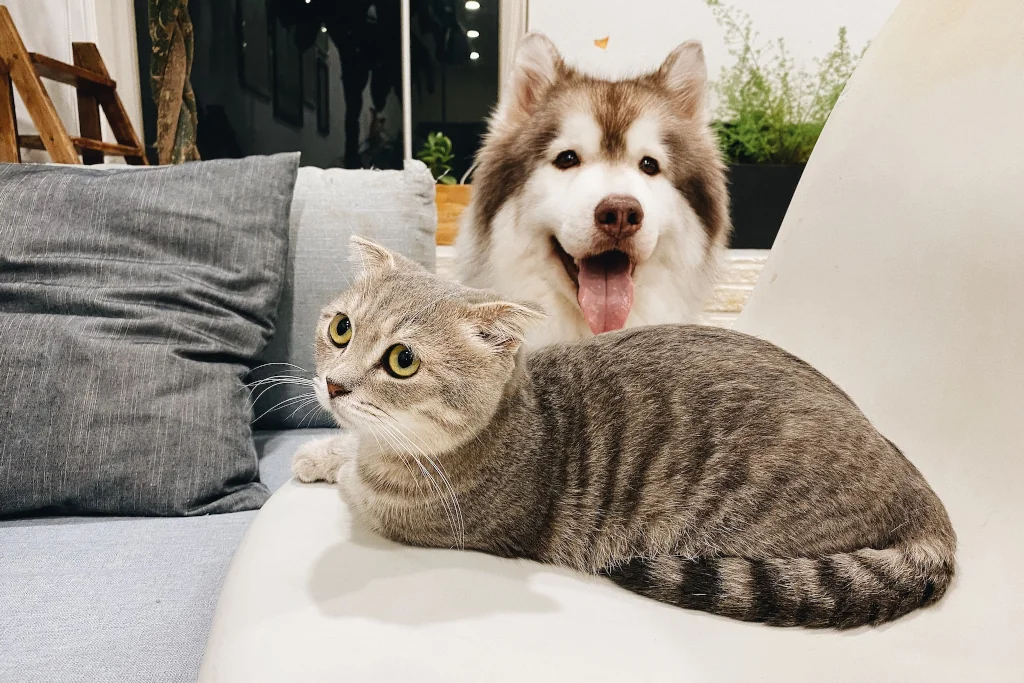Disclosure: We may earn a commission from helpful, relevant links in our content. No cost to you. See our privacy policy.
Juggling between a wagging tail and purring fur? It can be quite a task, especially when it comes to ensuring that both your feline and canine companions are healthy and safe from potential diseases. One such concern might be: Can unvaccinated cats be around dogs?
Pet health has its complexities, but it’s an engaging journey. With our guidance, you’ll gain the knowledge and confidence to keep your furry companions safe and healthy!

Why Do Cats Need Vaccines?
Cats need vaccines for the same reason we humans do – to bolster their immune systems against harmful diseases.
Vaccines introduce a harmless form of the disease to the cat’s immune system, training it to recognize and fight off the real thing. So, if Mr. Whiskers gets exposed to a disease he’s been vaccinated against, his immune system is already primed to ward off the infection.
For indoor cats, vaccinations still play a crucial role as they protect against diseases that can be brought into the home on shoes or clothes, or by other pets.
Just think of vaccines as tiny superheroes training your cat’s immune system for the big fight against nasty villains!
Dangers to Dogs From Unvaccinated Cats
Unvaccinated cats, while they might appear perfectly healthy, can unknowingly harbor diseases that can be harmful to dogs.
The danger lies in what we call ‘zoonotic diseases‘, which are diseases that can be transmitted from animals to humans or, in this case, from one pet species to another.
This list includes but isn’t limited to parasites like fleas and ticks, fungal infections like ringworm, and bacterial diseases like leptospirosis. It’s like an unwelcome party of potential problems that you definitely don’t want to RSVP to!
Vaccinating your cat not only keeps her healthy but also acts as a protective shield for your dog, especially if they are sharing the same living spaces.
How to Prevent Diseases Between Cats and Dogs
Preventing disease transmission between cats and dogs isn’t just about vaccines, it’s about implementing an all-encompassing strategy to maintain a healthy co-habitat for your fur family. Here are some tips that will certainly help:
- Regular Vet Check-ups. Routine veterinary care is crucial to catch any health issues early on. Both cats and dogs should have at least one annual wellness check. Consider it a preventive measure for your peace of mind!
- Control Parasites. Regularly check your pets for ticks and fleas, and administer treatments as needed. Remember, a parasite-free pet is a happy pet! We have guides for external parasite control for both dogs and for cats, so check them out.
- Hygiene Habits. Simple practices like washing pet bedding, disinfecting common play areas, and regular grooming can keep disease-causing organisms at bay. It’s about creating a healthy home environment for your pets.
- Separate Feeding Stations. Although it might seem cute when your dog and cat share a meal, it’s safer to have separate feeding stations. This reduces the chance of spreading diseases through saliva.
- Behavioral Training. Train your dog not to be aggressive towards the cat and vice versa. Stress can impact a pet’s immune system, making them susceptible to diseases.
If you’re committed to staying on top of your pets’ health between vet visits, you might consider the Whistle GO Explore. This health and location tracker for pets is well-regarded for monitoring your pet’s activity and behaviors, and it provides early detection for many health issues. While devices like these aren’t a substitute for professional veterinary care, they can undoubtedly support you in maintaining your pets’ well-being. Check it out here.
Benefits of Vaccinating Your Pets
Vaccinating your pets is a proactive step towards their wellbeing. But the benefits don’t stop at disease prevention. Here’s a fresh look at why vaccination is a win-win situation for all:
- Herd Immunity. Just like in humans, vaccinating a large population of pets helps in creating herd immunity, decreasing the overall prevalence of certain diseases. Your pet’s vaccination contributes to the broader health of all pets in your community.
- Cost-Effective. Yes, vaccines are an expense. But treating diseases can be even more costly, both financially and emotionally. Vaccines are a cost-effective solution in the long run.
- Travel and Accommodation. Many boarding facilities and airlines require proof of certain vaccinations. Keeping up-to-date with vaccines ensures your pet can accompany you on your travels or have a safe place to stay while you’re away.
- Longevity and Quality of Life. Vaccinated pets are likely to live longer, healthier lives. They are protected from severe illnesses that can cut their lives tragically short or significantly decrease their quality of life.
And here’s a benefit that often goes overlooked:
- Human Health Protection. Certain diseases, like rabies, can transfer from pets to humans. In fact, WHO reports that “In up to 99% of cases, domestic dogs are responsible for rabies virus transmission to humans”. By vaccinating your pets, you’re indirectly protecting your own health. It’s an instance where pet care and human healthcare intersect, creating a safer environment for everyone!
When Should I Vaccinate My Cat?
Let me tell you a little about my own personal journey with my cat, Smokey, which might help illuminate the path to feline vaccinations.
Smokey, my delightful and agile feline friend, was just six weeks old when he got his first set of vaccinations.
He got what’s called “core vaccines” – a protective shield against common and dangerous feline diseases like panleukopenia (feline distemper), feline calicivirus, feline herpesvirus type I (rhinotracheitis), and rabies.
Fast forward to today, Smokey is a fully-grown adult cat, still energetic, and living his best life. His secret? Regular booster shots, of course. After the first year, cats should get booster shots annually or once every three years, based on your vet’s advice and the type of vaccine.
Smokey’s story isn’t unique. His vaccination journey reflects that of many other cats.
And as his guardian, the most significant insight I’ve gained is this: vaccinating your cat isn’t a one-off task but a consistent commitment to their health and well-being. Vaccination is a team effort – you, your pet, and your vet, all working together for the love of health and longevity.
FAQs
While some diseases affect both dogs and cats, their vaccines are not interchangeable. Each species has its unique vaccines, formulated specifically for their immune systems.
How can I protect my dog from diseases if I have an unvaccinated cat?
Keeping your cat indoors reduces its exposure to diseases, which can protect your dog. Additionally, regular veterinary check-ups and good hygiene practices can minimize the risk of disease transmission.
Is it safe for puppies to be around unvaccinated cats?
It’s risky for puppies to be around unvaccinated cats as they can catch diseases. Puppies’ immune systems are still developing, making them more susceptible to infections. It’s best to ensure all pets in the household are vaccinated to protect their health.
Can a dog catch fleas from an unvaccinated cat?
Dogs can catch fleas from any animal infested with these parasites, including unvaccinated cats. Fleas can jump from host to host, regardless of vaccination status.
Alex, a passionate animal lover, has experience in training and understanding animal behavior. As a proud pet parent to two dogs and three cats, he founded AnimalReport.net to share insights from animal experts and expand his knowledge of the animal kingdom.




